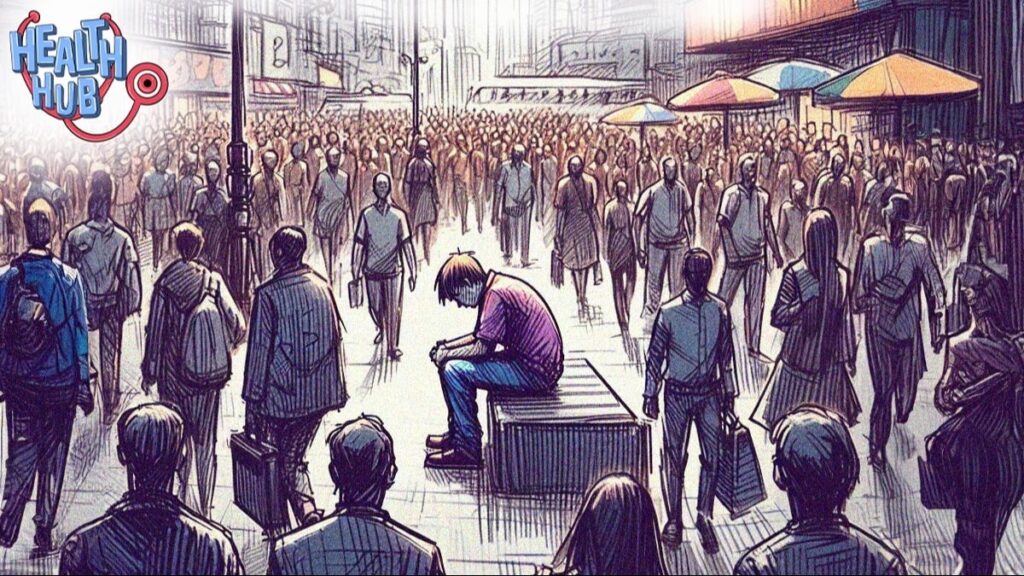If you walk into a room full of people at a party, it will be difficult to pick out which person is mentally isolated. Is it the person who sits in the corner and refuses to engage in conversation, or is it the person who cracks jokes and lights up a group of acquaintances?
Loneliness can be difficult for people to recognize, but according to a report on the state of global connectivity, 1.25 billion people will consider themselves “lonely” or “very lonely” by 2023. I feel that it is.
According to statistics from the World Health Organization (WHO), around 10% of young people and 25% of older people are lonely.
But of course these numbers underestimate the true scale of this silent epidemic in the world.
What is loneliness?
How you view loneliness is highly subjective. However, it is a distressing experience that occurs when a person realizes that his or her social relationships are less in quantity or even of lower quality than expected.
Psychologists agree that loneliness, once recognized as a “state of mind” or “just a phase,” has transcended its definition and standard meaning.
One theory suggests that loneliness is also characterized by personality traits such as shyness, social anxiety, hostility, sadness, and low self-esteem, which may make it difficult to share information about oneself with co-workers.
Cognitive approaches suggest that lonely people tend to have a pessimistic outlook, which characterizes their perception of life.
Loneliness and our ecology
In 2021, researcher Steve Cole described loneliness as “fertility for other diseases.”
Research shows that loneliness puts people at risk of physical illness and can lead to a shorter lifespan. People without strong social connections are at higher risk for sleep disorders, diabetes, rheumatoid arthritis, lupus, coronary heart disease, high blood pressure, obesity, and many other diseases.
Loneliness can promote the buildup of plaque in your arteries, reduce cognitive function and cause brain diseases like Alzheimer's disease, and even cause cancer cells to grow.
Loneliness: a public health concern
Loneliness has become a public health concern in India, as health experts warn of a new 'dementia epidemic'. Many other mental health disorders are steadily increasing in this country, including depression, bipolar disorder, schizophrenia, and substance abuse disorders.
In 2017-18, the initial phase of the Longitudinal Aging Study of India (LASI) tested around 72,000 people across India. The researchers found that 20.5% of adults over 45 experience moderate loneliness and 13.3% experience severe loneliness.
Loneliness is also associated with socio-economic challenges. A 2013 study found that high poverty rates, income inequality, low education, high dependency rates, lack of transportation, unplanned urbanization, rapid industrialization, and deteriorating social capital are associated with loneliness. became.
Research shows that the COVID-19 pandemic has exacerbated income inequality and exacerbated these socio-economic challenges.
Dr Valli Kiran, a psychiatrist at Bangalore's SPARSH Hospital, said loneliness is increasingly becoming a global problem in the context of a burgeoning mental health crisis.
“This is partly due to the breakdown of traditional family structures. The shift from joint to nuclear families, increased divorce, and single-parent households impact parents and especially their children. The trend towards individualism is further accelerated by the declining influence of social values,” said Dr Valli Kiran.
A peer-reviewed study published in 2022 claims that younger students appear to be suffering from the stress of the pandemic. This may be due, in part, to their less developed academic abilities and increased demands for social interaction.
How will this silent epidemic subside?
Governments, health systems, community organizations, and the technology industry can work together to combat this epidemic.
Dr Sushma Gopalan, child psychologist at Aster CMI Hospital, told IndiaToday.In, You need to ensure quality relationships. Support groups and workshops can help spread awareness. ”
Dr. Sameer Malhotra, director of mental health and behavioral sciences at Max Super Specialty Hospital, pointed out that families can add depth to their interactions.
Dr. Sameer Malhotra told India Today, “There is a lack of depth in interactions and real-world connections that can contribute to feelings of loneliness.”
He added that stress in the mind is converted into stress in the body, causing psychosomatic disorders.
Dr. Rachana G, a pediatrician at Rainbow Children's Hospital in Bangalore, spoke about the collaborative efforts of parents, educators and the community.
“The key is open communication. Children need to feel safe when approaching adults or caregivers so that they can develop resilience during difficult times. From social situations. There is a need to pay timely attention to potential anxieties that may arise so that the child can continue to actively participate in the social environment,” Dr. Rachana emphasized.
Chido Mpemba, WHO's Special Envoy for Youth for the African Union, very accurately described the problem underlying the loneliness epidemic. “Social isolation can affect anyone, anywhere, at any age. Investing in social connections is a productive and resilient process that promotes the well-being of current and future generations.” This is essential to creating a stable economy with a strong economy.”

